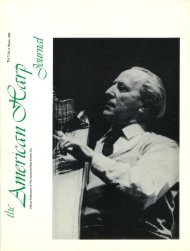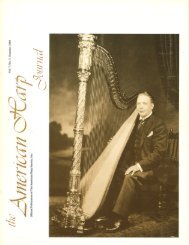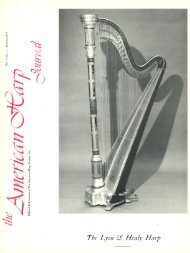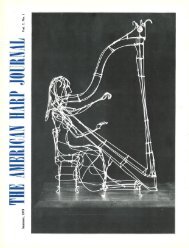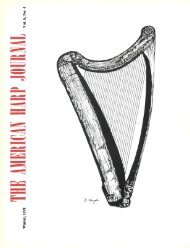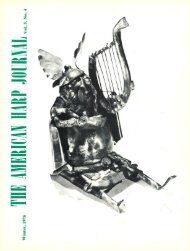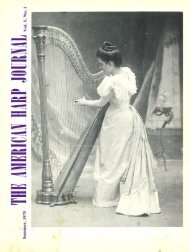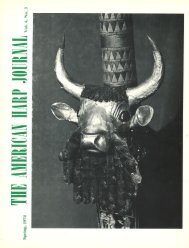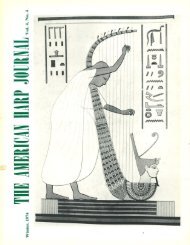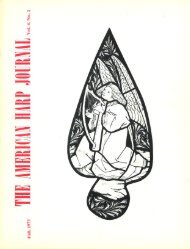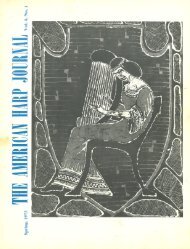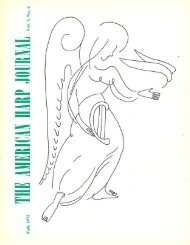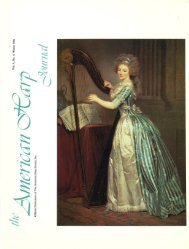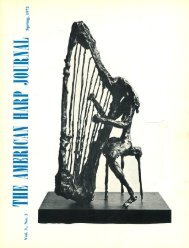Create successful ePaper yourself
Turn your PDF publications into a flip-book with our unique Google optimized e-Paper software.
eing ordered. I asked him to please make a sample and<br />
send it to me but I never heard from him. The next <strong>Summer</strong><br />
when I returned he had moved away-gone out of<br />
business. I have never been able to locate him so my<br />
tote-bag was not realized. But really, someone should<br />
carry out the idea, as I still think it is great. So don't go<br />
on stage in evening clothes with a bag like this. You<br />
must carry strings with you for if a string should break<br />
you can't run off-stage for your equipment.<br />
Another point in preparedness is keeping your harp<br />
in very fine condition. Mr. Christiansen conducts wonderful<br />
workshops all over the country helping us to give<br />
more attention to the care of our harps. I heartily recommend<br />
that any of you who have the opportunity to<br />
attend one of these should do so, because it teaches you<br />
a reverence for your instrument which a lot of us don't<br />
have. When you realize what a precious thing you possess<br />
and how hard it would be to replace, your care of<br />
it will become an extremely important part of your life.<br />
Be sure you don't have noisy pedaling. This can be<br />
aided by having good pedal felts on your harp. Last<br />
night we all knew how many pedals were being changed<br />
but there was not one pedal sound in the entire concert.<br />
It was just miraculous--truly a stupendous exhibition<br />
of beautiful pedaling.<br />
Among other things that we try to emphasize is to be<br />
a part of the music-listen to it-don't allow yourself<br />
to be distracted. Remember you are a musician in the<br />
orchestra, and in being that, forget that you are a<br />
harpist.<br />
S. M.: I want to say something about protecting your<br />
harp. At one time, we had three or four players in the<br />
symphony who were "bull-in-a-china-shop" types.<br />
When they wanted to leave the stage at rehearsals, they<br />
would come dashing by the harp in a rush to get out.<br />
I finally learned to turn the harp around so they would<br />
approach it from the back; then they couldn't fly into<br />
the sounding board with a brief case, a clarinet box,<br />
or a contrabassoon. I also moved my music stand aside<br />
so it wouldn't fall into the harp if someone ran into it.<br />
In spite of my precautions, on a very crowded stage<br />
one of the 'cellists stepped on the A pedal and split the<br />
brass. He apologized with, "The world is my china<br />
shop!" It was nice of him to say so. My message to you<br />
is: Don't just walk away from your harp and trust to<br />
luck.<br />
<strong>No</strong>w we are going back to letter "C." This is about<br />
CONDUCTORS and your responsibility to your conductor.<br />
Again, we can't be prima donnas. With orchestra<br />
parts, just play as the conductor asks, even if you<br />
don't like his interpretation. I was interested in reading<br />
Phia Berghout's words in the Journal, " . .. the harpist<br />
must be in the first grade with each conductor, for they<br />
all have their own ideas ... "<br />
When we were planning this workshop, Marjorie<br />
and I thought a great deal about conductors. We hoped<br />
we might get some ideas which we could pass on to you.<br />
We wrote to eighteen conductors but received only a<br />
small number of replies since many of them were on<br />
tour in or out of the United States.<br />
16<br />
Parts of the letter from Robert Irving, charming English<br />
conductor of the New York City Ballet, are worth<br />
reading: " ... I am sorry not to have answered your<br />
letter before, asking for a conductor's comments for<br />
your harp conference. We have been preparing for our<br />
great Ravel orgy here, now launched: but also I could<br />
not really find any 'mots' for you of any special validity<br />
or interest. But here are just one or two small thoughts:<br />
(1) 'Most usual, I'm sure! All harpists, while growing<br />
up, should retain some concern for OTHER harpists<br />
and not deface the music with their own mnemonics<br />
and hieroglyphics!' " I'm sure Mr. Irving has had harpists<br />
come to him with, "How do you expect me to play<br />
that, when the pages are full of holes and are stuck together<br />
with Scotch tape?" I have encountered such<br />
ballet books with pages which I had to pry apart. We<br />
learned from Salzedo in the '30s not to use Scotch tape<br />
on music. While it may be all right for awhile, eventually<br />
it yellows and develops gooey edges which stick<br />
together. At rehearsals, I have rubbed face powder<br />
between the pages, then I have sprinkled them with<br />
flour or talcum when I got home so they wouldn't stick<br />
again when the book was closed.<br />
VOICE FROM AUDIENCE: "May I interrupt?<br />
3M here in St. Paul has developed a 'million year tape'<br />
for manuscripts .. . And you are right. The Toscanini<br />
library at one time used the old tape on those precious<br />
scores and they found out about this--and this new<br />
tape was developed for manuscripts and music."<br />
S. M.: I have heard of the new tape and I have used<br />
it, but some of the old parts are still making the rounds.<br />
Aren't you proud that 3M is right here and is so progressive<br />
along these lines?<br />
Back to Robert Irving's letter: (2) "I would like to<br />
see more emphasis on sight-reading in the training of<br />
young harpists, who seem to me too often deficient in<br />
this respect." I think most teachers discover that sometimes<br />
their highly gifted students--those who can play<br />
by ear or who memorize quickly-hardly recognize<br />
what they are playing if they see it on the page. This<br />
can be very devastating if these young people are in an<br />
orchestra and they haven't really learned to read music.<br />
Constant practice in sight-reading is recommended for<br />
all harpists, regardless of how talented they may be.<br />
Mr. Irving's next comment interests us very much:<br />
(3) "I find that the newest harps, though doubtless superior<br />
mechanically, are often poor tonally in comparison<br />
with the older (heavier!) instruments: please<br />
don't all rush out and buy them before checking on this<br />
aspect." Marjorie and I were puzzled by this statement<br />
at first. After we thought awhile, we concluded that,<br />
with harp prices what they are and with delivery of the<br />
larger harps delayed as it has been for some years, more<br />
and more people have been buying the smaller harps<br />
and using them in the pit when the ballet came to town.<br />
Mr. Irving's remark helps prove one important point:<br />
It is highly desirable to use the best possible instrument<br />
because it enhances your playing.<br />
I was genuinely pleased to hear from Maurice Peress,<br />
AMERICAN HARP JOURNAL




